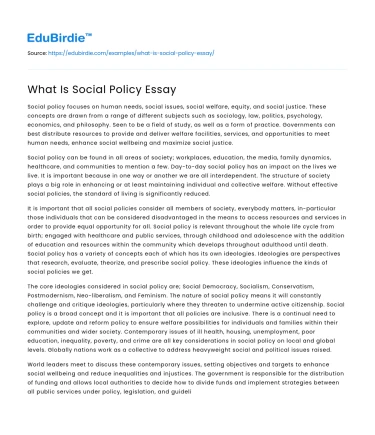Social policy focuses on human needs, social issues, social welfare, equity, and social justice. These concepts are drawn from a range of different subjects such as sociology, law, politics, psychology, economics, and philosophy. Seen to be a field of study, as well as a form of practice. Governments can best distribute resources to provide and deliver welfare facilities, services, and opportunities to meet human needs, enhance social wellbeing and maximize social justice.
Social policy can be found in all areas of society; workplaces, education, the media, family dynamics, healthcare, and communities to mention a few. Day-to-day social policy has an impact on the lives we live. It is important because in one way or another we are all interdependent. The structure of society plays a big role in enhancing or at least maintaining individual and collective welfare. Without effective social policies, the standard of living is significantly reduced.
Save your time!
We can take care of your essay
- Proper editing and formatting
- Free revision, title page, and bibliography
- Flexible prices and money-back guarantee
It is important that all social policies consider all members of society, everybody matters, in-particular those individuals that can be considered disadvantaged in the means to access resources and services in order to provide equal opportunity for all. Social policy is relevant throughout the whole life cycle from birth; engaged with healthcare and public services, through childhood and adolescence with the addition of education and resources within the community which develops throughout adulthood until death. Social policy has a variety of concepts each of which has its own ideologies. Ideologies are perspectives that research, evaluate, theorize, and prescribe social policy. These ideologies influence the kinds of social policies we get.
The core ideologies considered in social policy are; Social Democracy, Socialism, Conservatism, Postmodernism, Neo-liberalism, and Feminism. The nature of social policy means it will constantly challenge and critique ideologies, particularly where they threaten to undermine active citizenship. Social policy is a broad concept and it is important that all policies are inclusive. There is a continual need to explore, update and reform policy to ensure welfare possibilities for individuals and families within their communities and wider society. Contemporary issues of ill health, housing, unemployment, poor education, inequality, poverty, and crime are all key considerations in social policy on local and global levels. Globally nations work as a collective to address heavyweight social and political issues raised.
World leaders meet to discuss these contemporary issues, setting objectives and targets to enhance social wellbeing and reduce inequalities and injustices. The government is responsible for the distribution of funding and allows local authorities to decide how to divide funds and implement strategies between all public services under policy, legislation, and guidelines produced by the government.






 Stuck on your essay?
Stuck on your essay?

